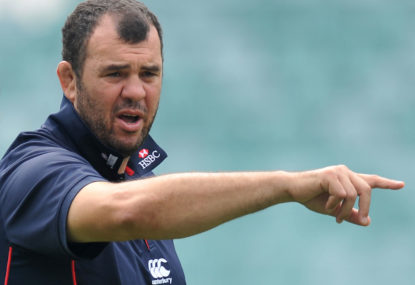Australia has just finished the Rugby Championship series, finishing third out of four nations.
The Wallabies are now off to Europe for another five Tests against the best of the Northern Hemisphere.
“A fish stinks from the top,” said Alan Jones, former successful Wallaby coach of the state of Australian rugby before the Wallabies’ departure.
The now-resigned McKenzie had lost a few Tests matches and the dressing room in his unhappy stint as Wallaby coach.
Considering the quality of the other international sides, it is not a hanging offence and no reason for a McKenzie to die of shame – especially given his distinguished playing record.
You’d say Jones has just got it the wrong way around, given the state of Australian rugby at the bottom, but the top-heavy Wallaby program shows there definitely is something rotten in his stinking fish.
At the bottom, nothing illustrates the rot more than a Sydney rugby faction’s attempt to kill off Parramatta a few seasons back.
Parramatta were almost gone and searching for a new home, their licensed club sold and players backing up through the grades to make up the numbers.
It took hard work from dedicated Two Bluesters to revive the club, culminating in them making the finals in 2013.
This was Parramatta, with their huge junior nursery and a history spanning more than a century. This is the club that has supplied players from Ken Kearney to Eric Tweedale, from Ray Price and Tony Melrose and many more.
This is Sydney rugby that can brag about having the world’s biggest competition through the sub-district clubs, but has virtually given away weekend junior competitions.
The neglected bottom should be the foundation for the top, not the other way around.
This is a code that has gone from second behind rugby league to a distant last behind football and even AFL. Yet, the code had self-interested members willing to sacrifice Parramatta – a club in the heart of Eels, Western Sydney Wanderers and now AFL territory.
Meanwhile at the top, Tests are played with such frequency, they’re like club games in this corporatised, endless-season age. And that doesn’t even consider the ever-expanding Super Rugby competition.
There’s no need to be a traditionalist to remember a time when a Test match was an event, when NSW versus Queensland was a game of State-of-Origin intensity, when even City v Country had more significance than some Super Rugby games.
Then there is the game itself.
Keen-minded fans might remember a Perth Test several seasons back when England were awarded two penalty tries in a game the Wallabies won well.
Penalty tries for what? For the England forwards buckling the Australian scrum on the sideline and forcing technical infringements.
Well, they enjoy a good refereeing display in the northern hemisphere and well-won technical penalties, but new watchers might have asked what it had to do with football?
Keen-minded fans might watch today’s game with its scrums, lack of rucking, forwards and backs lined out in defence on the advantage line and 20-plus phases and remember a better spectacle.
Leather-patch wearers might say it takes greater tactical nous to play this game, superior strategies etcetera.
However, prospective new watchers are likely to say ‘no, thank you’.
Should Michael Cheika produce winning Wallabies, and they’re not far off it, that will just disguise the rot.
Jones might celebrate the McKenzie demise and produce a Sheffield Shield-Test cricket analogy.
Other observers might think it’s just not cricket the way McKenzie was hung out to dry, when a root-and-branch overhaul is needed.
An equivalent of a rugby league Phil Gould – with both football and business nous – might be the type to conduct it. And to weed out those who are bigger than ‘Team Australia’, as he did at Penrith in the NRL.
Meanwhile, leather-patch types can play the ‘my game is better than your game’ game, speculating on whether Sonny Bill Williams or Sam Burgess will succeed with the All Blacks and in English rugby respectively.
To which the answer is ‘it’s horses for courses’.
Ask any rugby league club would it swap Williams or Burgess for any All Black or British Lion, if they had the choice.
Or remembering Kent Lambert and Tony D’Arcy’s unfortunate rugby league experiences, would a rugby nation have swapped them for any rugby league forward in the top five?
Players for courses, it seems.
Which only means Brad Thorn has received insufficient credit for representing the Brisbane Broncos, the Kangaroos – and then the All Blacks in the tight five.





























































































